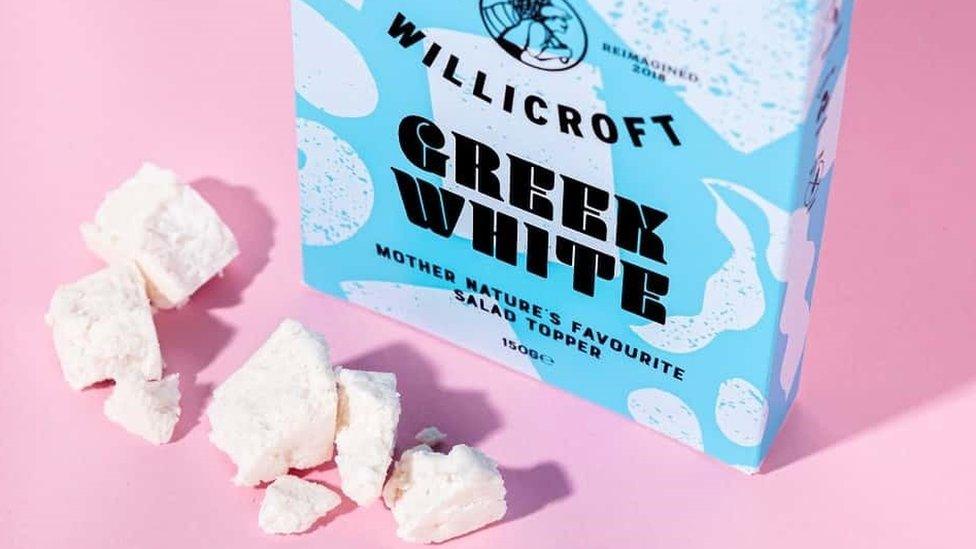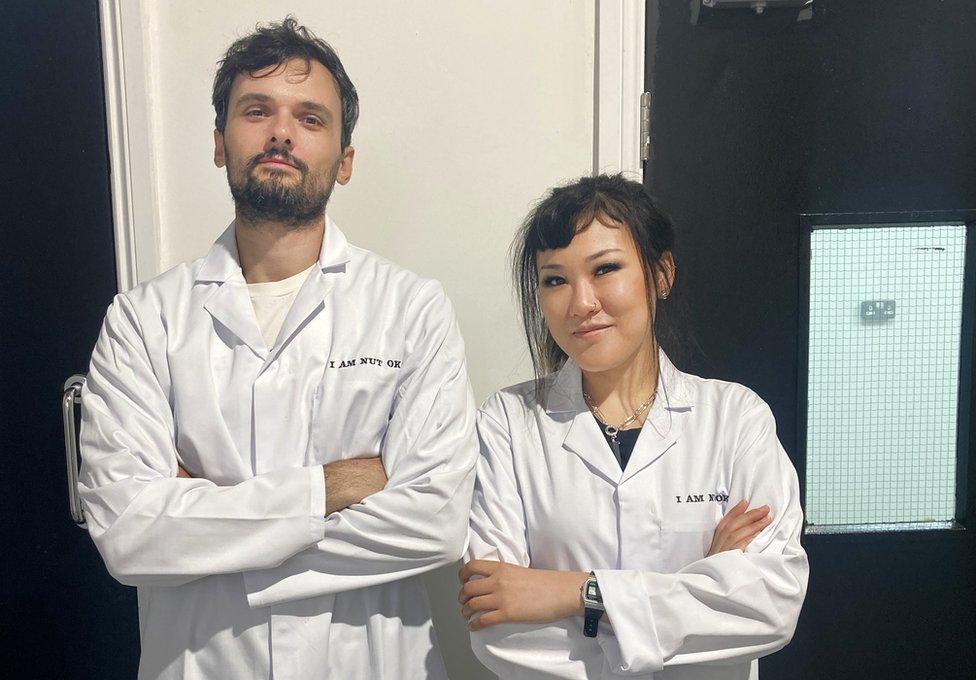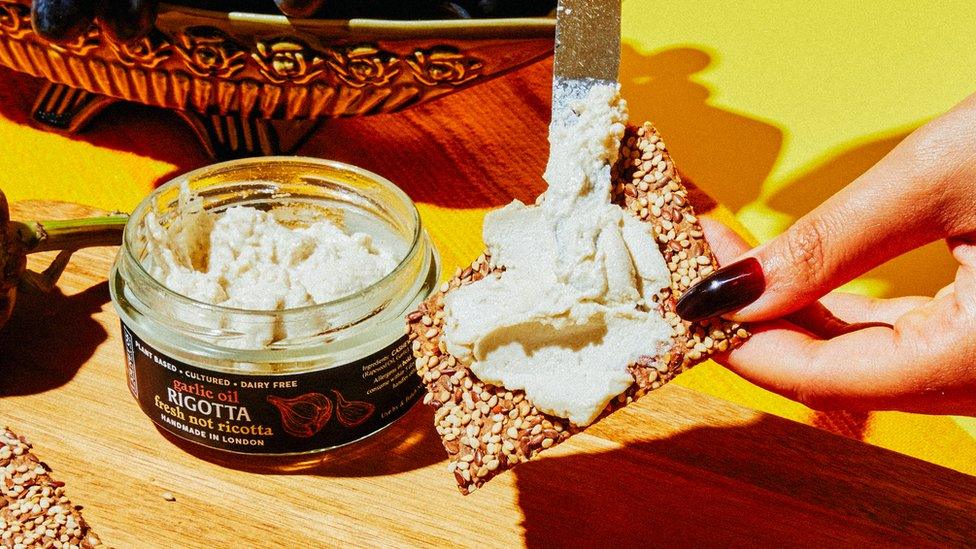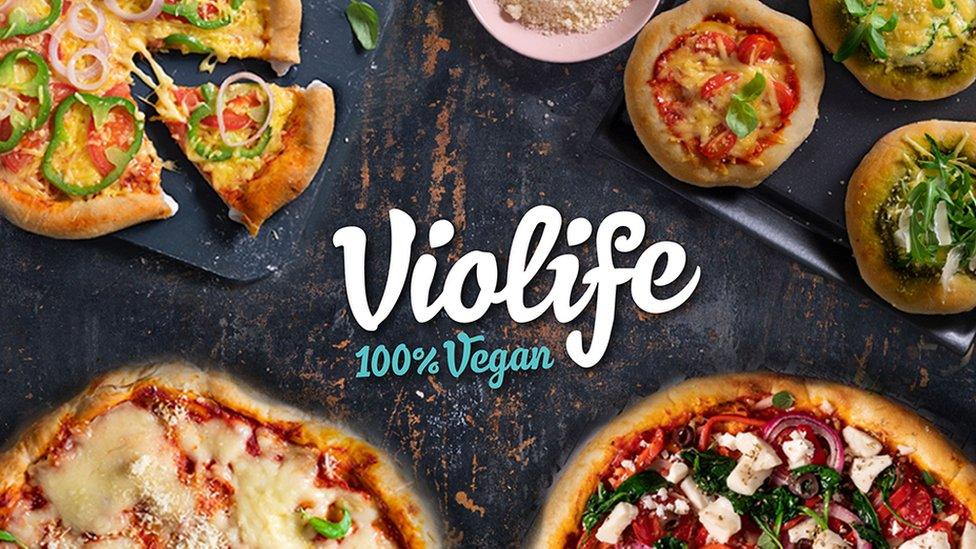Vegan 'cheese' market booms as demand grows
- Published

Sales of vegan cheese substitute are continuing to rise strongly around the world
As a teenager, Brad Vanstone used to help out on his grandparents' dairy farm in Devon during the holidays.
But in an unexpected twist, decades later he now has quite a contrasting career running a vegan cheese-substitute business.
He set up the brand - Willicroft - in 2017, after switching to a plant-based diet, and struggling to give up cheese.
"I looked high and low in supermarkets for good replacements, but struggled to find any," says Mr Vanstone, who like his business is based in Amsterdam.
Made from assorted white beans, such as haricot and cannellini, Willicroft now offers five products - "Young Dutch", which imitates gouda; "Italian Aged", which aims to be like parmesan; "Greek White", a feta substitute, plus a fondue, and a sauce made for the dish macaroni cheese.

Brad Vanstone says much vegan substitute cheese in supermarkets isn't very good
These are available to buy at numerous stockists across the Netherlands, and at the firm's one store in central Amsterdam.
And overseas expansion is now continuing, with plans to launch in Germany before the end of this year. The firm's products are already on sale in the UK at the seven branches of Amazon's Whole Foods chain, and it is looking to add another UK supermarket to its roster.
However, Mr Vanstone says his plans to launch a wholesale business in the UK, to sell to other retailers, have been fraught with difficulties following Brexit.
"If we were to do it independently, to give you an example of how much harder it is, we used to be able to send samples to the UK for €20 ($21; £17.60), and it would take two to three days max [for them to get to the addressee]," he says.
"Now if we send samples it's €200 minimum, and one in three won't get there."
Brexit issues aside, the sale of vegan substitute cheese is a global market continuing to see stellar levels of growth. Sales are predicted to rise to $7bn by 2030, up from $2.5bn in 2020, according to one report., external
In a similar story to Mr Vanstone's, Nivi Jasa co-founded I Am Nut Ok with his partner in 2017. He was inspired after moving to a plant-based diet and finding the then available vegan substitute cheeses "pretty terrible".

Nivi Jasa, pictured here with his partner Angela Chou, says that initially he didn't think he'd like vegan substitute cheeses
"I said I'm not going to eat vegan cheese at all," recalls Mr Jasa, who is a London-based Italian. "But my partner is from LA, which is 10 years ahead [in terms of food trends], and so she made some cashew cheese cream and I loved that.
"At the time we were both broke and said 'why don't we combine our love of food, and our designer backgrounds, and create a vegan cheese brand so we have enough money to pay the bills?'."
The company started life on a stall at Broadway Market in Hackney, east London, and now has eight products sold online, and across more than 200 stockists in the UK including Selfridges.
"We stand for flavour," says Mr Jasa. "Most supermarket [vegan] cheese is either too plain or has a plastic rubbery texture."
However, like many small businesses, he says it's been a challenging year. "We haven't seen any growth. There's been rising energy costs, the cost of ingredients such as sunflower oil from Ukraine is super expensive, and people are spending less."

I Am Nut OK has more than 200 UK stockists
Business was previously stronger when the company exported to Germany and France. "But then Brexit came and we were hit by problems, such as more paperwork at customs, and paying import tax, and risk of delays," says Mr Jasa.
"It was too risky and expensive if stock needed to be thrown out."
Plus, he says, there's confusion on both sides of the border about how to classify vegan substitute cheese. The brand is starting to work with an international distributor to try to help remove some of the obstacles.
The global leader when it comes to vegan substitute cheese is Greek-based Violife, whose products are exported to more than 60 countries including the US, UK, Germany and the Netherlands.
One of reasons it has proved successful says Victoria Slater, Violife head of Northern Europe, is that the brand, whose products are made from coconut starch, is "very adaptable to different regional demands".

Victoria Slater says Violife tries to mimic the most popular cheeses in each country
"For example, every country will have their preferred cheese," she says. "Such as halloumi in Cyprus, manchego in Spain, and cheddar in the UK. We are able to flex the flavour and formats to best reflect the specifications of the 60 countries we're in."
Violife now also sells Camembert and blue cheese substitutes.
Yet Ms Slater adds that the sector is feeling the effects of the continuing cost of living crisis. "It's a tough macroeconomic environment in a lot of countries. Cheese is a choice product, not a necessity like toilet roll."
Still, it's a market that is undoubtedly growing, as more people move towards a plant-based diet. UK supermarket Tesco tells the BBC that it has seen sales of vegan substitute cheeses grow by nearly a third over the past year.

Greek firm Violife is the market leader for vegan substitute cheeses
"Plant-based diets are becoming increasingly popular, although cheese is often where people have struggled previously to find the right alternative to suit them," says Fay Hasnip, plant-based product development manager at Tesco.
"With demand rising, we have placed an increased focus on offering our customers a wide range of plant-based cheeses that deliver on quality, taste and texture, to offer some variety and choice for plant-based shoppers."
Angharad Goode, a food and drink research analyst at market insight firm Mintel, says the increased public spotlight on sustainability has seen many people reassess their dairy usage.
It comes as research earlier this year for Violife claimed that the manufacturing of its products released half as much carbon as the production of dairy cheese., external
Ms Goode adds that vegan cheese substitutes are also growing in popularity simply because they are now more widely available. She points to some of the best-known diary cheese brands, such as Philadelphia and Babybel, releasing vegan versions.
"This is boosting availability and visibility, and helping to dial up price competition," she says.

Global Trade

However, Ms Goode adds that the typically high price of vegan cheese substitutes. poses the biggest barrier to further sales growth, especially with more of us now minding our pennies.
Take two prices at UK supermarket Sainsburys. You can buy 400g of its own-brand medium cheese for £2.85. Yet 200g - half the weight - of Violife's "Epic Mature Cheddar Flavour Block Vegan Alternative to Cheese" costs £2.75.
Ms Goode also thinks that some producers of vegan cheese substitutes need to ensure that they "deliver on the eating experience" - make them taste better.
Back in Amsterdam, Mr Vanstone agrees. "What's available at mass retail is still really poor, both in terms of the taste, the actual impact of the product and also the nutrition.
"It's not really servicing anything other than just being a replacement. That being said, there is a growing number of good products out there and the potential is obviously enormous."